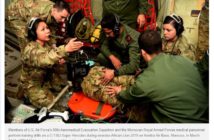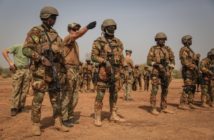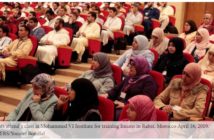Ahmed Herzenni discusses Morocco’s upcoming national referendum with top US government officials, experts, and media
Washington, D.C. – Ahmed Herzenni, who served as President of the Moroccan Advisory Council on Human Rights from 2007 through 2010, former political prisoner under the Hassan II regime, and one of the architects of Morocco’s historic constitutional reforms, was in Washington this week to meet with officials, academics, media, and Moroccan-American youth to discuss Morocco’s path towards reform.
On Monday, Mr. Herzenni first met with Zeinab Elnour Abdelkarim, Regional Director of the Middle East & North Africa Division of The International Foundation for Electoral Systems (IFES), an international non-profit that provides electoral support to countries around the world in efforts to increase citizen participation and promote democracy. Herzenni then headlined a discussion at the Woodrow Wilson International Center for Scholars, a nonpartisan institution engaged in the study of domestic and international affairs, where he was introduced by Dr. Haleh Esfandiari, Director of the Center’s Middle East Program. He spoke to a full room of attendees which included Executive Vice President and COO Michael Van Dusen as well as human rights experts and democratic reform scholars.
Monday afternoon, Herzenni met with foreign policy and Islamic studies experts at the Brookings Institution, one of the nation’s most influential and well-respected nonprofit think tanks. Herzenni then went to the U.S. Department of State, where he continued to discuss foreign affairs and the role of the Moroccan democratic process with Deputy Assistant Secretary Kathleen M. Fitzpatrick. In the evening, he attended a dinner with former Senator Robert Kasten, Jr. and Amal Mudullali, Advisor to former Lebanese Prime Minister Sa’ad Hariri.
Tuesday, Mr. Herzenni held a press conference to leading American media at the National Press Club with MoroccoTomorrow, a new youth-based organization of Moroccans living overseas and committed to reform in their mother country. Following the press conference, Herzenni had a sit-down with Congressional staffers, including members of the offices of Congressmen Aaron Schock (R-IL), Ed Whitfield (R-KY), Dan Burton (R-IN), Jeff Fortenberry (R-NE), and Alcee Hastings (D-FL), as well as staffers from the House Foreign Operations Appropriations Subcommittee, the House Foreign Affairs Committee, and the Commission on Security and Cooperation in Europe (or U.S. Helsinki Commission). Herzenni then participated in a roundtable discussion at the Hudson Institute, a nonpartisan policy research organization. The roundtable was hosted by Dr. Hillel Fradkin, Director of the Hudson Institute’s Center on Islam, Democracy and the Future of the Muslim World.
In the afternoon, Herzenni met with Robert Malley, former Special Assistant to President Bill Clinton for Arab-Israeli Affairs, and Program Director for Middle East and North Africa at the International Crisis Group, an international NGO dedicated to resolving conflicts around the world. He ended his evening at dinner with Theodore Kattouf, former Ambassador to the United Arab Emirates and later Syria, and currently President of AMIDEAST, the leading American non-profit organization engaged in international education, training and development activities in the Middle East and North Africa.
Wednesday morning, Mr. Herzenni met with Jared Genser, President of Freedom Now, an international non-profit that works to free prisoners of conscience, before meeting with Senator John McCain (R-AZ). Herzenni’s morning ended with sitting down with members of the American Foreign Policy Council, a non-profit whose mission is to provide assistance and guidance on foreign policy issues to lawmakers. The meeting was hosted by Ilan Berman, Vice President, and an expert on foreign policy in the Middle East and Asia.
In the afternoon, Herzenni first met with staffers from the Senate Committee on Foreign Relations. Then, he made his way to the Washington Institute for Near East Policy, a public educational foundation dedicated to scholarly research and informed debate on U.S. interests in the Middle East, where he met with David Schenker, Aufzien Fellow and Director of the Program on Arab Politics. Before catching a flight to New York, Herzenni had one final meeting with Michael McVicker, Lead Democratic Staffer at the Tom Lantos Human Rights Commission of the House Committee on Foreign Affairs.
Herzenni’s visit to the US comes in advance of a historic referendum in Morocco, which the people will be voting on this Friday, July 1. As demonstrators took to the streets of various Arab countries this spring, demanding the removal of their heads of state, Moroccans similarly gathered – but chanting for greater socio-political reform, not the abdication of their king Mohammed VI. Understanding the need for greater transparency, openness, and regionalization on the political level, a newly-formed constitutional committee drafted significant changes to the existing constitution. These include the recognition of the Amazigh language and heritage as essential to the Moroccan identity, the guarantee of an independent judiciary, and the election of the Prime Minister by majority rule in Parliament instead of by appointment by the King as has been the custom.
For media inquiries, please write to media@moroccotomorrow.org
About Ahmed Herzenni
Mr. Herzenni, a political prisoner for 12 years under King Hassan II, Mohammed VI’s father, is now playing an active role in shaping Morocco’s transition to a more democratic future. He was appointed to the post of President of Morocco’s Advisory Council on Human Rights (CCDH) in May 2007 by King Mohammed VI before stepping down recently to become a member of the commission that drafted the constitutional reforms.
Mr. Herzenni has a long and distinguished career as a professional dedicated to education and the improvement of conditions in Morocco. Holding a Ph.D. in Sociology and Anthropology from the University of Kentucky and a Diploma of Higher Studies in Sociology from the Rabat Faculty of Arts and Humanities, Herzenni first worked as a teacher, and later become a sociologist specializing in rural and environmental affairs. Throughout his illustrious career, he has held a number of posts relating to resource management, sustainable environmental and agricultural development, social sciences, human development, and participatory and democratic methods.









